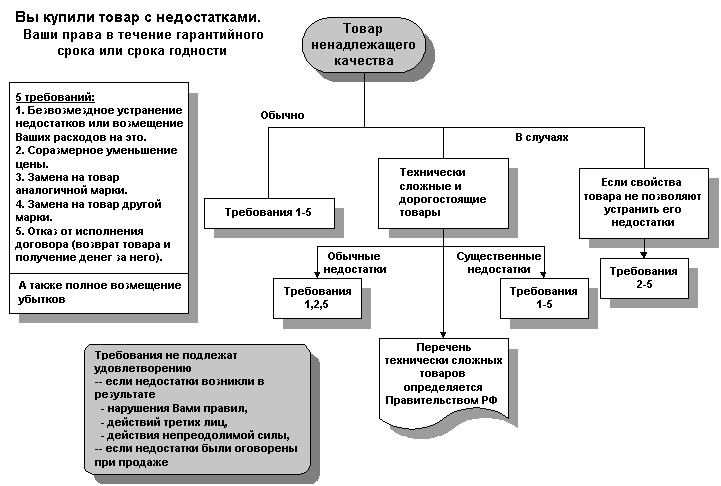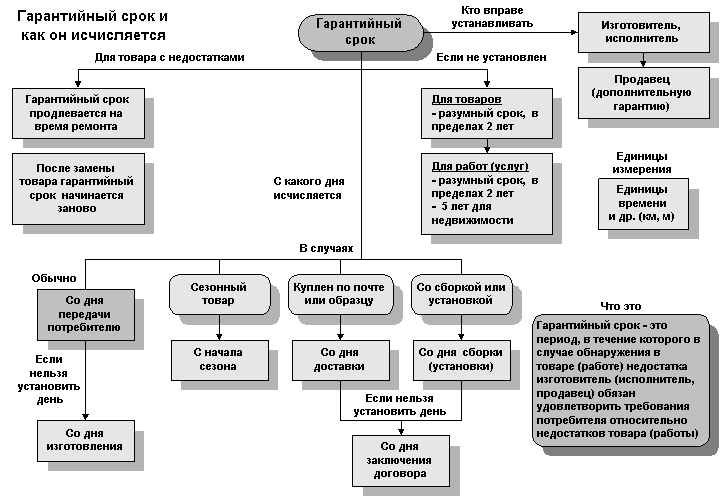Thousand devils! Consumer? Defend yourself!
It so happened that the legislation of the Russian Federation for the most part is far from perfect. It contradicts itself, is interpreted in many ways and is generally difficult for perception.
But there is a ray of light in the dark kingdom!
Consumer Protection Act. Wonderful thing, believe me. With the pumped skill of using this law, you can become a real consumer. a terrorist. This, incidentally, is a semi-official term - that’s the name of people who deliberately abuse the wide opportunities that are provided by the aforementioned law.
So! What are you entitled to!
At the request of NermaN, I will try to compile a manual, like what.
From the point of view of our legislators, we may have “just goods” and “technically sophisticated goods”
The list of "technically sophisticated" was recently expanded, now they are considered as such:
1. Light aircraft, helicopters and aircraft with an internal combustion engine (with electric motor)
2. Cars, motorcycles, scooters and vehicles with an internal combustion engine (with electric motor) designed for driving on public roads
3. Tractors, motor blocks, cultivators, machinery and equipment for agriculture with an internal combustion engine (with electric motor)
4. Snowmobiles and transporters mercury products with an internal combustion engine (with electric motor) specially designed for movement in snow
5. Sports, tourist and pleasure boats, boats, yachts and motorized floating vehicles with an internal combustion engine
6. Navigation and wireless communications equipment for domestic use, including satellite communications, having a touch screen and having two and more functions
7. System units, stationary and portable computers, including laptops, and personal electronic computers
8. Laser or inkjet multifunction devices, monitors with a digital control unit
9 Satellite TV sets, game consoles with a digital control unit
10. Televisions, projectors with a digital control unit
11. Digital cameras and video cameras, their lenses and optical photo and film equipment with a digital control unit
12. Refrigerators, freezers, washing machines and dishwashers, coffee machines, electric and combination stoves, electric and combined ovens, air conditioners, electric water heaters with electric motor and (or) microprocessor automation
With the first, everything is simple.

So, within 14 days (not including the day of purchase), your rights are very broad.
The availability of food products is quite logical - it would be foolish to return half a can of black caviar, referring to the fact that it did not fit you in a complete set.
The mysterious “List of non-exchangeable goods” is alarming. I won’t give a list here. You can familiarize yourself with it yourself - it is at the end of this Government Decree .
And if the purchased goods are of inadequate quality?

I will focus on the shortcomings. As you can see, they can be "substantial" and "ordinary" (non-essential). At the same time, significant defects are understood as such defects that cannot be eliminated at all or without disproportionate or time-consuming, or manifested repeatedly or again after their elimination, and other similar defects . All other shortcomings of the product are considered normal.
Of course, habra-users are especially keenly interested in the process of exchanging a light aircraft of inadequate quality or a motoblock, however, these products are on the list - therefore, the order of exchange of "technically complex" goods will be the same. It will only be possible to return money, exchange such goods if there are significant shortcomings. And this is a very flexible concept.
Example: You bought a phone, and after 20 days the paint peeled off. With a 90% probability, the seller will refuse you a refund or exchange, and it will be completely legal that the 15 days that you have for exchanging a technically complex product if there are any shortcomings in it have already passed. And this means that it will be possible to return money or change, ONLY if the drawback is significant. From the point of view of life - of course it is substantial, also unaesthetic. But from the point of view of the law - not everything is so simple. For example, if the seller has a spare case for this phone model and can replace the peeling one, the lack of goods should be recognized as eliminated, i.e. inconsequential.
In the event of a disagreement between the seller and the consumer as to whether peeling of the paint is a significant drawback, this dispute may be resolved in court.
In the Law we are considering, this is spelled out as follows (Article 18 of the Law of the Russian Federation “On Protection of Consumer Rights"):
In the case of a technically complex product, in case of defects in it, the consumer has the right to refuse to fulfill the contract of sale and demand a refund of the amount paid for such a product or to demand a replacement for a product of the same brand (model, article) or another product brands (models, article) with the corresponding recalculation of the purchase price within fifteen days from the date of transfer of such goods to the consumer. After this period, these requirements shall be satisfied in one of the following cases: -
detection of a significant shortage of goods;
- violation of the deadlines established by this Law for eliminating defects in goods;
- the inability to use the product during each year of the warranty period for a total of more than thirty days due to the repeated elimination of its various defects.
Pay attention to the second part of this article. Did the seller or manufacturer violate the deadlines for correcting the defects of the goods? Exchange or refund! Did the product break down twice or more often during each year of the warranty period and was it repaired more than 30 days? Exchange or refund!
If the seller resists, drags out deadlines, etc. write a claim, and if it does not take effect - to court. In most cases, the seller radically changes his position after receiving a statement of claim.
Warranty.

Here I would like to talk about the "lifetime warranty."
In many ways, this marketing gimmick corresponds to a joke:
Hello, my hard drive has a LIFETIME WARRANTY, and now it has died "
- Well, if" dead ", then the warranty is over.
When selling such goods, the seller assigns a warranty period that is very different from the lifetime one, and that's it what happens after this period is regulated by a separate document of the manufacturer and is an additional obligation.
Of course, such an additional obligation is better than nothing, but it is not a panacea. Usually there is a bunch of conditions You will need to comply with the rules and nuances that must be observed, starting from a special phone number listed on the manufacturer’s website (not the fact that you will find it) ending with “using the product with accessories that are not approved by the manufacturer of the product.”
Consumer rights is an extremely wide area with extensive judicial practice and many features. However, this legislation really works and really protects the interests of the buyer. When writing this article, I repeatedly tried to invent a bicycle, drew my diagrams, tried to express my opinions in a simple language. Then he abandoned these attempts. And buyers, sellers, and goods - all this is so individual that it is impossible to comb under the general algorithm. Therefore, I used the tables from ozpp.ru and tried to supplement them with my comments.
If such a plan will interest the community, I can suggest the following:
Describe in the comments your problems related to the protection of consumer rights and the most popular questions, I will write a separate post with a detailed explanation of your situations from the point of view of the Law.
Thanks!
But there is a ray of light in the dark kingdom!
Consumer Protection Act. Wonderful thing, believe me. With the pumped skill of using this law, you can become a real consumer. a terrorist. This, incidentally, is a semi-official term - that’s the name of people who deliberately abuse the wide opportunities that are provided by the aforementioned law.
So! What are you entitled to!
At the request of NermaN, I will try to compile a manual, like what.
From the point of view of our legislators, we may have “just goods” and “technically sophisticated goods”
The list of "technically sophisticated" was recently expanded, now they are considered as such:
1. Light aircraft, helicopters and aircraft with an internal combustion engine (with electric motor)
2. Cars, motorcycles, scooters and vehicles with an internal combustion engine (with electric motor) designed for driving on public roads
3. Tractors, motor blocks, cultivators, machinery and equipment for agriculture with an internal combustion engine (with electric motor)
4. Snowmobiles and transporters mercury products with an internal combustion engine (with electric motor) specially designed for movement in snow
5. Sports, tourist and pleasure boats, boats, yachts and motorized floating vehicles with an internal combustion engine
6. Navigation and wireless communications equipment for domestic use, including satellite communications, having a touch screen and having two and more functions
7. System units, stationary and portable computers, including laptops, and personal electronic computers
8. Laser or inkjet multifunction devices, monitors with a digital control unit
9 Satellite TV sets, game consoles with a digital control unit
10. Televisions, projectors with a digital control unit
11. Digital cameras and video cameras, their lenses and optical photo and film equipment with a digital control unit
12. Refrigerators, freezers, washing machines and dishwashers, coffee machines, electric and combination stoves, electric and combined ovens, air conditioners, electric water heaters with electric motor and (or) microprocessor automation
With the first, everything is simple.

So, within 14 days (not including the day of purchase), your rights are very broad.
The availability of food products is quite logical - it would be foolish to return half a can of black caviar, referring to the fact that it did not fit you in a complete set.
The mysterious “List of non-exchangeable goods” is alarming. I won’t give a list here. You can familiarize yourself with it yourself - it is at the end of this Government Decree .
And if the purchased goods are of inadequate quality?

I will focus on the shortcomings. As you can see, they can be "substantial" and "ordinary" (non-essential). At the same time, significant defects are understood as such defects that cannot be eliminated at all or without disproportionate or time-consuming, or manifested repeatedly or again after their elimination, and other similar defects . All other shortcomings of the product are considered normal.
Of course, habra-users are especially keenly interested in the process of exchanging a light aircraft of inadequate quality or a motoblock, however, these products are on the list - therefore, the order of exchange of "technically complex" goods will be the same. It will only be possible to return money, exchange such goods if there are significant shortcomings. And this is a very flexible concept.
Example: You bought a phone, and after 20 days the paint peeled off. With a 90% probability, the seller will refuse you a refund or exchange, and it will be completely legal that the 15 days that you have for exchanging a technically complex product if there are any shortcomings in it have already passed. And this means that it will be possible to return money or change, ONLY if the drawback is significant. From the point of view of life - of course it is substantial, also unaesthetic. But from the point of view of the law - not everything is so simple. For example, if the seller has a spare case for this phone model and can replace the peeling one, the lack of goods should be recognized as eliminated, i.e. inconsequential.
In the event of a disagreement between the seller and the consumer as to whether peeling of the paint is a significant drawback, this dispute may be resolved in court.
In the Law we are considering, this is spelled out as follows (Article 18 of the Law of the Russian Federation “On Protection of Consumer Rights"):
In the case of a technically complex product, in case of defects in it, the consumer has the right to refuse to fulfill the contract of sale and demand a refund of the amount paid for such a product or to demand a replacement for a product of the same brand (model, article) or another product brands (models, article) with the corresponding recalculation of the purchase price within fifteen days from the date of transfer of such goods to the consumer. After this period, these requirements shall be satisfied in one of the following cases: -
detection of a significant shortage of goods;
- violation of the deadlines established by this Law for eliminating defects in goods;
- the inability to use the product during each year of the warranty period for a total of more than thirty days due to the repeated elimination of its various defects.
Pay attention to the second part of this article. Did the seller or manufacturer violate the deadlines for correcting the defects of the goods? Exchange or refund! Did the product break down twice or more often during each year of the warranty period and was it repaired more than 30 days? Exchange or refund!
If the seller resists, drags out deadlines, etc. write a claim, and if it does not take effect - to court. In most cases, the seller radically changes his position after receiving a statement of claim.
Warranty.

Here I would like to talk about the "lifetime warranty."
In many ways, this marketing gimmick corresponds to a joke:
Hello, my hard drive has a LIFETIME WARRANTY, and now it has died "
- Well, if" dead ", then the warranty is over.
When selling such goods, the seller assigns a warranty period that is very different from the lifetime one, and that's it what happens after this period is regulated by a separate document of the manufacturer and is an additional obligation.
Of course, such an additional obligation is better than nothing, but it is not a panacea. Usually there is a bunch of conditions You will need to comply with the rules and nuances that must be observed, starting from a special phone number listed on the manufacturer’s website (not the fact that you will find it) ending with “using the product with accessories that are not approved by the manufacturer of the product.”
Consumer rights is an extremely wide area with extensive judicial practice and many features. However, this legislation really works and really protects the interests of the buyer. When writing this article, I repeatedly tried to invent a bicycle, drew my diagrams, tried to express my opinions in a simple language. Then he abandoned these attempts. And buyers, sellers, and goods - all this is so individual that it is impossible to comb under the general algorithm. Therefore, I used the tables from ozpp.ru and tried to supplement them with my comments.
If such a plan will interest the community, I can suggest the following:
Describe in the comments your problems related to the protection of consumer rights and the most popular questions, I will write a separate post with a detailed explanation of your situations from the point of view of the Law.
Thanks!
